The State of Medium
My keynote from Medium Day 2023
Below is a transcript of my keynote talk from Medium Day on August 12, 2023. You can watch the video here.

Hello, you’ve arrived at the State of the Union for Medium. I hope you’re enjoying Medium Day.
I’m Tony Stubblebine, the CEO at Medium. I’m here to give you an update on all things Medium.
The gist of what I have to say is that we have good news, a lot of good news. To explain it, I want to start with a story about a reader. The reader’s name is Laurie, and recently she sent us an audio about what she was reading. I know audio is kind of a funny way to send in feedback, but that’s how she sent this.
Laurie’s message answered a question I’ve been asking myself: Do the stories we share have impact? The reason I ask myself this question is because running a company of this size means that I spend a lot of time in the numbers. I know if the numbers go up or if they go down, and I basically have some sense of what makes them go up and what makes them go down.
But I’m always curious to know the people behind the numbers. When I was an author on Medium, I used to feel that it was a trap to write in a way that thought too much about making the metrics move. You lose track of who your readers actually are.
The bottom line for writing is that it’s a product for a human to read, and yet we spend all of this time considering these non-human factors, like virality and algorithms and SEO.
It’s important to keep track of the human on the other end, because at the end of this funnel of algorithms and growth hacks, the bottom line is that you’re trying to share your wisdom with another human being. That’s the bottom line in almost all formats. It’s true with fiction, non-fiction, poetry, essay, tutorial, academic research. They’re all — when they’re done in a healthy and authentic and passionate way — designed to transform the reader in a way that makes the reader’s life better.
So, I worry that I spend too much time looking at numbers. And that’s why I appreciated hearing this message from Laurie as an answer to whether or not we make a human impact beyond just the numbers:

I got an email from Medium and I started reading one article and then another one.
Each posting was just like hitting a different side of me and touching a part of me.
And I’ve just been crying a lot and learning a lot and it just made me want to call and say… I’m glad [Medium] exists.
I had so many feelings when I heard that, and still even hearing it again. The main feeling is just awe that the authors of Medium can make a reader feel those feelings, right? That’s what we’re here to celebrate.

It’s a birthday for Medium. We’re 11 years old, but Medium is a community and so the celebration is about the entire community. That’s why we’re doing Medium Day in such a community-first way.
There’s never been anything like this event, and I say that as someone who used to work in events. The thing that makes this event special is not me, not this keynote. It’s almost as if I could have just blogged this [Editor’s note: heh, and I did!].
What makes Medium Day special is that there are 350 authors who showed up as part of 230 different sessions to try to tell their meaningful story in the world in a way that deepens other people’s understanding of the world.
That’s what we’re celebrating. Some of these speakers today are professional writers. Some are professionals who happen to write about their expertise. Some just lived hard, and now they’ve got a story to tell.
Think of today as the “show, don’t tell version” of the state of Medium. I’m here to tell you what’s going on with Medium, but I think you can just see it in all of the sessions that surround my keynote today. The experience you’re having at this event is a microcosm of what Medium is 24/7, every day of the year.

There is a foundational idea behind why Medium exists. That idea is that your stories have power — or at least they have power when you are in a healthy community that encourages and rewards your writing with love and authenticity and passion. Everyone has a story to tell.
There’s a way to write that’s not healthy, and there’s a way to write that is healthy and transforms people’s lives. We want to be the place for transformative, human stories.
Every one of you has an important story to tell. Everyone has a bit of wisdom or information that someone else needs. Often, someone out there desperately needs to hear what you have to say.
By telling your story, by taking the time to put it down into words, you’re doing an incredible act of service. When you share your story — and when we’re able to connect your story to another reader — something special happens: Your wisdom becomes their wisdom.

On Medium, 12.9 million authors have shared a story, and each time a story is shared, there’s a connection — a transfer of knowledge and wisdom from the author to the reader.
That transfer of wisdom has happened 17.6 billion times in the life of Medium. That’s a contribution to human wisdom which is not done by us as the people that build the software, but by the writing that you’ve done. It’s a number that, honestly, leaves me in awe of what we’re doing here, and grateful that I get to be a part of it.
Sometimes there’s a fear of writing, and I want to address that fear. I think, for some of us, this can come from a fear that you’re not good enough. I track this back to, by far, the most divisive word I’ve ever said to the community: “expert.” I said it one time when I first started working here, and I had people sending me notes for weeks saying that requiring expertise was gatekeeping. Then, separately, obviously well-known experts were telling me they were positive we wouldn’t recognize them as experts.
But no one seemed to hear the second half of what I’d said when I first talked about expertise: By definition, every single person is an expert in their own life. The power of giving everyone a voice, which is what we do at Medium, is that we get to learn from every variation of expertise.
We can hear from subject matter experts and from academics. We can hear from experts in their profession. We can hear from experts in a hobby. We can hear from experts in a singular experience. We hear from coaches, we hear from therapists, but I never discount the value of personal experience.
Your life, with all the challenges and quirks that feel so particular to you — those are where the most valuable lessons are. If we could live in a world where we all respect each other as fellow experts, I think we can start to see where Medium wants to go, and what we mean by writing with authenticity, love, and passion.
There’s a lot of fake stuff everywhere else. We’re trying to help encourage writers to share the real stuff — real wisdom — and help give readers an opportunity to receive it.
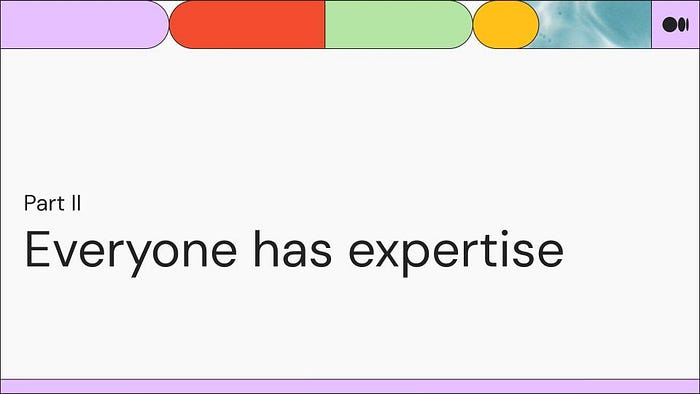
We want to make more meaningful connections between readers and the powerful stories people tell on Medium. That’s our role in this. Part of the way we do that is by making sure that the Medium community — the software and the systems we build — can spot and connect an important story, no matter where it comes from, with people willing to listen. That the most important part of this, right?
If you’re a writer, especially if you’re a full-time writer, you start to pick up certain marketing skills. But I don’t think these marketing skills should be required for everyone. You shouldn’t be required to build your own mailing list, you shouldn’t have to learn SEO, you shouldn’t have to build a social media following. Yes, those are all valuable tools of the trade for professional writers — but they undercut the idea of social media giving a voice to everyone.
Often, the people with a great story to impart are too busy living to learn those marketing skills. Medium is special because it’s a place where you can be heard just for sharing your academic research, or for being a great software engineer and telling people what you’ve learned, or for sharing new tools, techniques, or strategies as a designer. There’s a million definitions of merit that aren’t dependent on knowing how to market your writing.
To illustrate this, I want to pull a story. It’s a story of an author. His name is Kyle Planck.

Kyle had written on Medium four times before this particular story blew up. He was a pharmacology grad student who happened to be tracking the outbreak of the Monkeypox virus in Europe. By tracking, I mean he was obsessively reading and researching everything that he could. And then, even though he was almost the most prepared for it, he ended up being one of the first Americans in the U.S. to contract Monkeypox. So he did what we’ve been talking about: He wrote something with all of his passion, all of his knowledge, in a way that makes for a story more powerful than anything you can see in the newspaper.
He was able to summarize all the research he’s read (which was basically all the research anyone had ever published), and then, on top of that, to weave in his own story of getting and treating the virus. Because of the quality, the timeliness, and the importance of this story, it traveled across Medium, got noticed by our readers, and then got noticed by people who aren’t on Medium. His story got noticed by a major news organization.
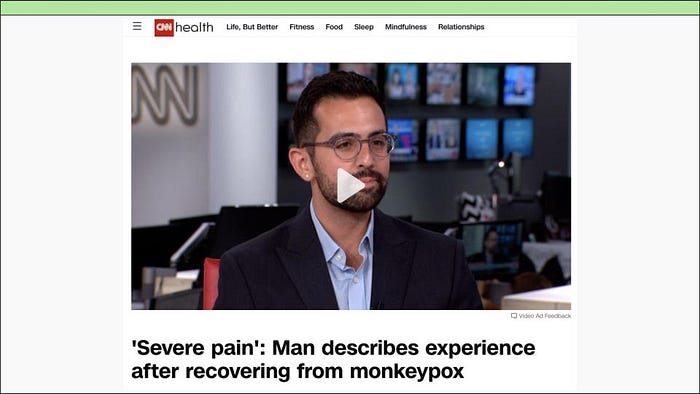
Two weeks after writing this on Medium, Kyle found himself on TV helping raise awareness for this virus as it entered the U.S.
That gets at something that Laurie didn’t say when she sent her feedback into Medium. She said that she’d read things that had moved her to cry, and that she’d read things that made her feel like she learned. But there’s another important reaction you can aim for as an author, and that’s that people take action.
What happened when Kyle told his story, and Medium worked — Medium doesn’t always work, but in this case it worked — to find this story and give it the legs and traction is that the government took action, started getting vaccines ready, it started raising awareness as well, and individuals were able to take action to protect themselves. That’s impact. That’s what I would consider the point of writing, the point of being in the type of business that Medium is in.

I want to talk about “The Boost”. A lot of you heard that we launched an initiative early in the year to help readers find the best of Medium. It’s called The Boost. And the reason we did this is because we have a very difficult challenge in the company.
That challenge is that people rely on us to help play the role of matchmaker. People come here and they say here’s what I’m interested in. What should I read? And the problem is, we can’t say, well, read everything, because there’s tens of thousands of new stories published on Medium every day. We have to do a pretty complicated set of calculations, using algorithms to try to match what’s good with what people are interested in. This is really the core responsibility of the company. The scale of that responsibility is that every month we make more than 8 billion recommendations.

We started by using the same algorithmic approach as a YouTube or a TikTok. But we found that there is a giant gap between what someone is willing to read and what someone wants to pay to read.
This is actually why we chose, as part of our mission, to be a member-supported company. A normal social media company like us would be ad supported, but we thought ad-supported incentives are wrong. We chose to be member supported because it raises the bar for what people expect of us.
For us, it isn’t enough to just generate attention. That would be fine for an ad-supported business. We all know how the TikTok algorithm works because we’ve had that experience of falling down a TikTok hole and then feeling regret.
Medium is aiming for something higher than regret. We want you to feel like your time on Medium was time well spent.
So our original approach led to this algorithm that was very similar to an algorithm that YouTube or a TikTok would use. But we had readers who were telling us they read a lot, but it didn’t feel like it was truly time well spent. So the game-changer for us, for our algorithm, is that we put humans back in the loop.
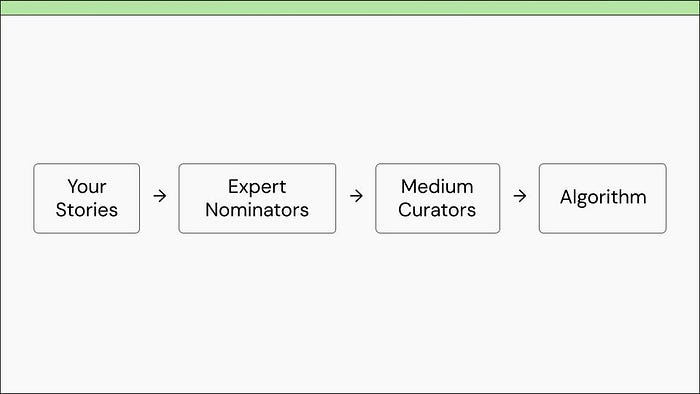
There are now two layers of humans in between a lot of what gets written and a lot of what gets recommended. Not everything, but a significant chunk of it.
One of those layers is a growing community of subject matter matter experts within the Medium community. These are the people that are looking for and nominating stories that they think are exceptionally important within their topic. The other is an internal curation team, the Medium curators, who act as a double-check and help keep the standards of quality and substance high. Once a story passes both standards, it’s Boosted and it’s treated with special care by our algorithm.
We’re always getting better at this, but one of the things I like about this adding a new signal to our recommendations is that it includes expertise that helps readers who might not be experts themselves.
For example, I don’t know anything about gardening, but I wish I did. So if I read an article about gardening, a standard recommendation algorithm can tell that I clicked on it, that I read it, and that I clapped for it. But it can’t tell if I followed the directions and liked the results. Or, this other thing — it can’t tell if there’s patently better advice somewhere else. Those are the things that subject matter nominators in our system spot instantly because they live and they breathe their subject. At least, that’s what happens when it’s done well.
And that’s the key — when this system is done well, having an expert help Boost stories on that topic is a huge service. It’s the equivalent of having your own team of research librarians combing through Medium looking for what you specifically should want to read. I think that’s a very special and unique service, and I don’t see that anywhere else on the internet.

We’re getting a lot of feedback that our recommendations have gotten better, but I also want to share one of the numeric signals that we’re getting that the Boost is working.
What we found with Boosted stories is that readers are 3% less likely to click on them. I think that says something that speaks to something that I was saying earlier about how you shouldn’t have to be a marketer to get your things read.
There’s a world of writers, and I’m one of them, who have spent a lot of time trying to master the art of writing a headline and title that people will click on. That’s part of getting read on the internet.
But there’s this other group that we’re trying to help surface where optimizing headlines just isn’t in their bag of tricks, that’s not what they’re good at. And so it’s not surprising to me that the click-through rate is lower.
However, by far the most important finding is that when a reader reads a Boosted story, they’re twice as likely to then become a paying member. This is how we know that we’re finally, finally building a recommendation system that meets this higher bar of time well spent.

The Boost program ends up being the best of the best, and we’re always looking for more stories to Boost. Everyone is eligible, and you don’t have to be in the Partner Program. We’re nowhere near the limit of what we could Boost. But, rightfully, the standard is very high because that’s the standard that our subscribers have.
If you wonder why we make a decision one way or another, [it’s because] at the end of the day, we are stewards of the money subscribers give us. The members, are in many ways, are our boss.
However, since not every story is going to be boosted, if you’re an author, where are the other ways you can go to find community for what you write?
The other way to get traction and readers and feedback is to go to the publications on Medium.
I used to run three publications on Medium, and when I ran them, I always suspected that supporting publications was sort of an afterthought for the Medium team. I’ve been here for 13 months and when I got here, I found out that I was right. Publications were an afterthought.
If you run a publication and you’ve suspected for a long time that maybe Medium wasn’t giving you the attention that you warranted, I can completely validate that you were right. But now things are changing.

The thing that I would want to say to validate publication editors even further about the importance of publications is: Do you know how much a Medium is stories that were published and edited by a publication? 45%.
Almost half of what people read on Medium went through the publication system here.
The passion and care that publications bring to Medium means that no writer ever has to feel alone. Somewhere, there is a publication that is interested in the same things you’re interested in and will help welcome you into the world of sharing your life through writing.
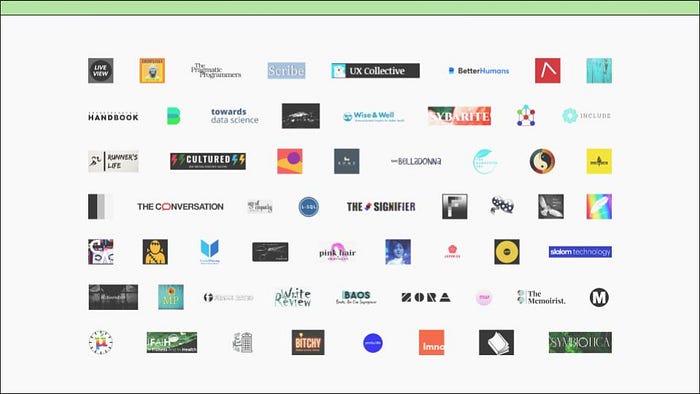
Because these publications have been overlooked — not given nearly the credit that they deserve — I just couldn’t help but give publications a moment in the sun. The logos on the screen here are just the tip of the iceberg. I don’t even have time to name half of these, but trust me, there are so many great publications on Medium, and we should be grateful.
While I have these on the screen, I want recognize a couple that I’ve run into.
I want to recognize Entrepreneur’s Handbook. The publisher of Entrepreneur’s Handbook works for Hopin, which is the software that’s running Medium Day. He did gave us a ton of help to set up the Medium Day Event.
That’s the thing about community: you end up knowing people in ways outside of why you met in the first place.
UX Collective, a huge force in the design world. Writing Cooperative is a huge force for writers. One of the special things about Medium for writers is that there are a lot of publications that are just focused specifically on the craft of writing.
I’ve long been a follower of Runner’s Life, and they shocked me one day because out of the blue, this guy started writing for him. And I don’t know, you probably don’t know who he is, but he had been the Editor in Chief of Runner’s World.
There must’ve been something constraining about writing for a mainstream publication because I feel like what he writes for Runner’s Life on Medium is Amby Unlocked. This is what he actually thinks and what he actually cares about. It feels like a huge honor and a huge validation of publications that someone of his status would show up and choose and embrace one.
Also on here, I saw an amazing special report on extreme heat from Wise & Well. There are a lot of doctors and physical therapists who write here. That kind of professional expertise on those topics ends up being special. So again, these publications are just at the tip of the iceberg and publications are such a big part of what makes Medium, Medium.

I mentioned already that Medium is member-supported. This is intentional and it’s core to our mission. We want the story to be primary.
We’ve observed over a long time of being involved in media companies on the internet that when you’re ad-supported, you quickly go down a dark path where attention is primary and quality is secondary.
So now, because of solutions like the Boost and publications, we’re feeling more and more confident in our ability to play matchmaker between quality and the reader and that we can treat the quality of the story as primary.
That has led to the story about something that happened within the company. One of the product leaders at Medium — that’s the role that proposes most product changes — came to me, her name is , and she had been talking to people at the company about why our reading experience had become cluttered.
It was actually a very minor amount of clutter. All it was was a list of suggested reading in the sidebar. But if you’re loving the story you’re reading, why should we be telling you about reading some other thing? We should be getting out of your way.
I tend to think mistakes like this — and we absolutely ended up considering this a mistake — mistakes like this come from a place of fear. I bet we had feared that you didn’t actually like what you were reading. And so we had thought, oh, we better solve that by trying to funnel you off to something different — not something better, something different.
What Breana saw is that we’re moving past this fear. And so she led this project to fix it and now our story pages look like this.
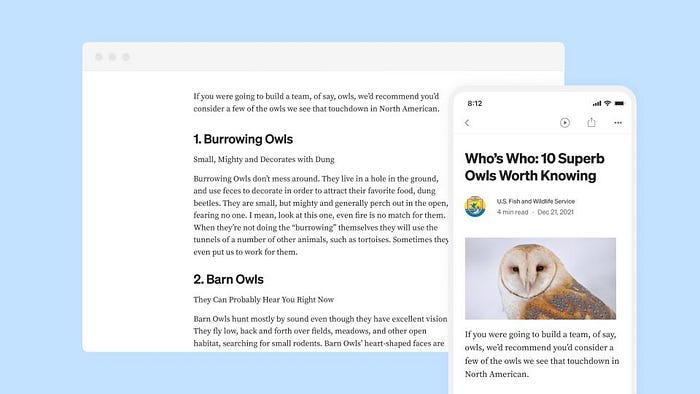
There’s not actually a lot to see here. That’s on purpose because all that’s on the screen now is what’s specifically important to the article itself.
The reason that I brought this up is because a reading experience like this is special compared to the rest of the internet. It’s special because it puts the story first, second, and third.
We trust the story to stand on its own. And we respect that you, the reader, are reading it for a reason.
I brought this up to make a comparison about the difference between being part of a member-supported community like Medium versus being out on the rest of the internet. I want to show you what a story looks like somewhere else.
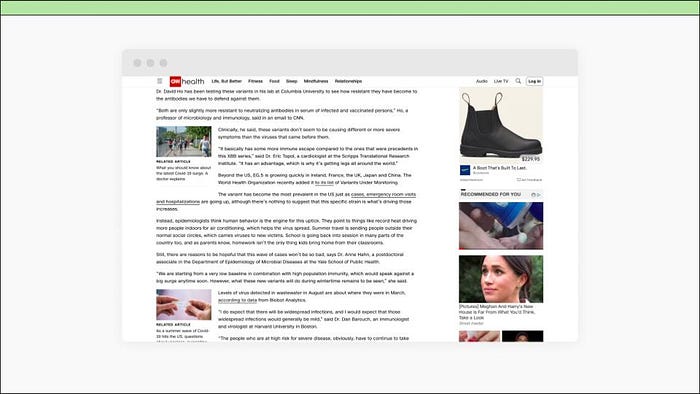
I’m not cherry-picking to find the worst example. This one is a completely typical reading experience. This one happens to be from a major news organization, but you could see experiences like this almost anywhere.
The clutter is easy to see. The clutter is almost more important than the story itself. This is clutter, this is clutter, this is clutter, this clutter more clutter, right?

What matters to the business behind this organization is that someone clicked on the story so that they can see all these other distractions. Essentially, the point of the story is to show you an ad.
The point of the story is not to deepen your understanding of the world. They’re not against it, but that’s not the goal. That’s not what makes their business work.
The problem is when the business has priorities like that, it trickles down to the author. Imagine you’re the author of this major news organization article. How important would it be to you to get this story right, to perfect it and craft it, if the people who are paying your salary don’t even care if it gets read?
For this organization, the story is secondary, and that has to cut into the morale and motivation of the authors.
It’s such a stark difference between what happens when we do things the Medium way and what happens when people do things the standard internet way.

From the outside, Medium is irrationally attached to doing some things differently.
Why does Medium have human curators, when TikTok, YouTube, and Twitter just use an algorithm?
Why does Medium have a membership instead of ads? In fact, authors often ask us, couldn’t you make more money if you ran ads?
Why do we focus on time well spent instead of attention?
Why do we base credibility on the content of an individual story rather than the influence of the author?
Why do we do profit shares with our authors?
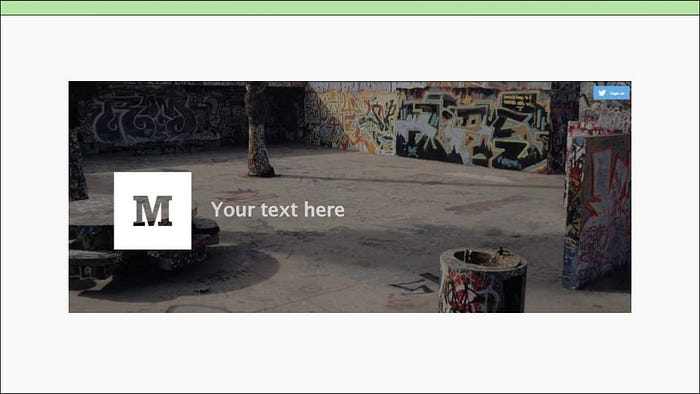
Well, the people who started this company, who’ve run it for the last eleven years, and now even me, we’ve been around and we’ve seen some things. Real talk.
What we’d seen, we didn’t like. This time we wanted to see something different. Of all the lessons from the past, the main lesson that we took from the rest of the internet is this:
Attention is not merit.
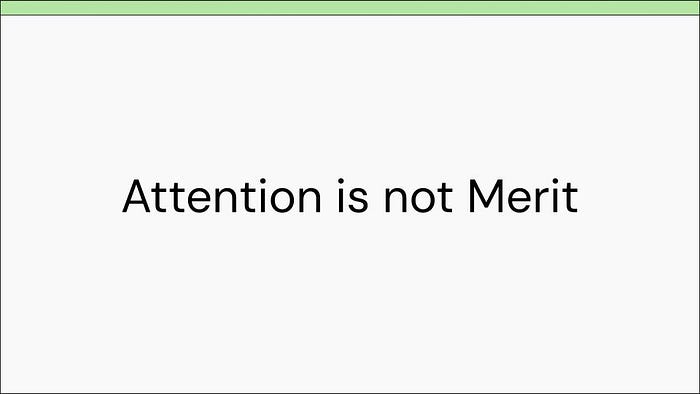
There are so many ways to get attention that do not deepen other people’s understanding of the world or pass one person’s wisdom to another. The reason that we do things differently is because we want a different result.
There needs to be a place for people to share their most thoughtful, passionate, curious, and kind voice. When we say we want to give everyone a voice, it’s that — it’s in a way that’s different than what you’ve already seen on the internet.

Now, high-minded talk always makes me suspicious. It’s not that I’m cynical exactly, it’s more that I’m practical. I always want to be talking about things that are possible.
So I want to tell you a story about Medium and our struggles, and then the turnaround that this team of 80 amazing engineers, designers, operators, editors, and writers have pulled off.
The turnaround is its own sort of proof point that the mission and the ideals that we’re aiming for are possible. In fact, there’s a part of the world that’s like you, that values quality, and wants to support it.
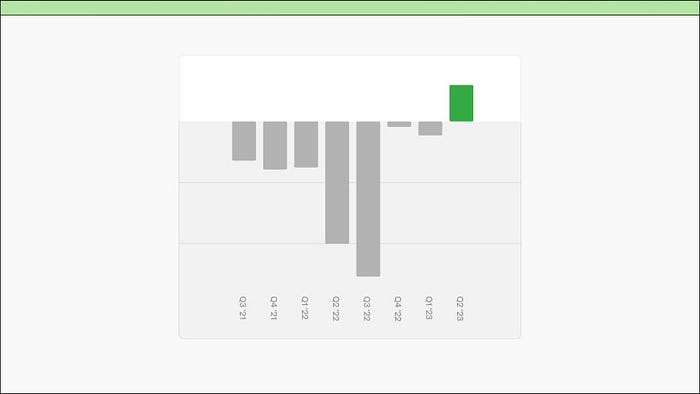
So 13 months ago — and I apologize, I’m a CEO, I live in graphs all the time, you might not live in graphs or love to see them or get really excited when one pops up on screen, but I’ll walk you through it — 13 months ago was the worst month in Medium’s history.
We had been losing subscribers, yes, losing subscribers for more than a year, and that month was even worse than any other month. And then some things changed. This team at Medium figured out a way to stop the losses, and then more recently figured out a way to grow again.
I know a lot of you watched Medium pretty closely and knew that we were adrift. Yes, I’m telling you, you were right.
I hate to be simplistic about the cause because there were so many causes, but I think the core cause is that we had gotten lost in the numbers and we didn’t have the human reader in mind.
We weren’t trying to get more reactions like the reaction that Laurie had sent us. Instead, we we’re trying to make numbers move.
A major number we were trying to get better at is finding the things that people wanted to read. Maximizing reads is a number that’s easy to track and it’s clear how to optimize for it. So that’s what we did for more than a year. We made huge progress in optimizing our ability to connect members to the things they wanted to click on and then read. But somehow the more progress we made, the more these subscribers left.
That’s the disconnection that you get when you only look at numbers. When you talk to a reader, you learn very quickly that there’s this huge difference between something they’re willing to read and something they’re willing to pay to read.
So we started focusing on finding and sharing these other stories, these ones that met the higher bar of our subscribers. These are the stories that have this effect of a reader feeling their time was well spent.
The chart that you’re looking at, it tells that story. It tells the story of what was happening when we were doing it the wrong way, and what started happening when when we got back to doing it the right way.
I also want to show you more recent numbers because they are their own additional proof point that yes, maybe it is possible for a company to exist and succeed that actually does care about passionate, thoughtful, honest, from-the-heart writing that earnestly aims to deepen another person’s understanding of the world. That is possible.

This proof point is that in June, 35,000 people signed up to be a Medium member. Then as we got better at recommending quality stories that gave readers the feeling of time well spent, we got more signups. In June, 35,000 people; in July, 47,000 people signed up. And right now in August we’re having a record month. We’re on track for a 101,000 people to subscribe to this new-and-improved Medium.
We don’t advertise. There’s no other place this growth is coming from. The only thing this growth represents is that we got better at finding the stories you’re already writing that are going to make readers feel like their time was well spent.
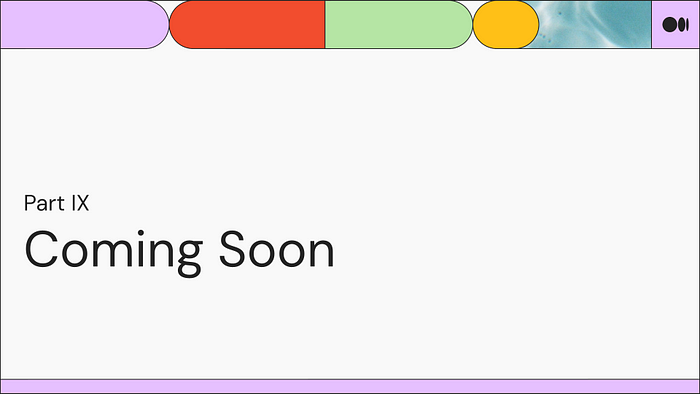
Everyone I talked to about this keynote ahead of time wanted to know what’s coming, but I have a real resistance to vaporware, so I don’t love to demo things that aren’t launched, but I do have some hints and confirmations about what’s coming. I’m going to run through them.

First of all, yes, I can confirm India, Brazil, and Thailand will be joining the Partner Program shortly. We are currently working on this and we’re excited to welcome those of you from these countries into the Partner Program. Then by the end of the year, we’re expecting to support 60 more countries.
We believe in this. In order to deepen people’s understanding of the world, it is important that Medium becomes a globally inclusive place to hear from voices all over the world. That’s core to the mission.

I used to run three publications here, I mentioned that already. And so I know what a challenge it can be. And yes, we plan to make running your publication easier for you.

Something called Friend Tier is coming in September. I have nothing more to say about that.
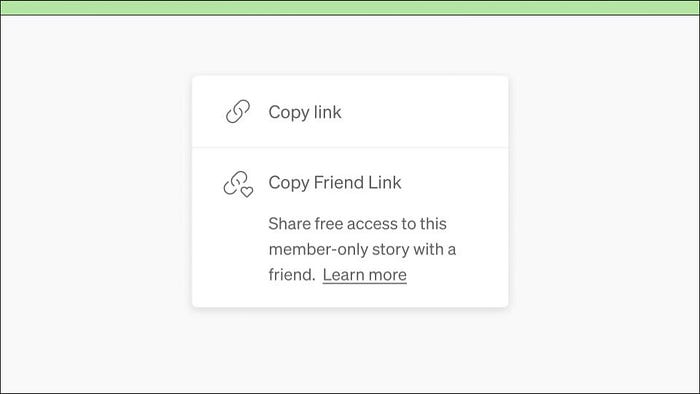
Shareable Friend links are coming for readers. We already have them for authors. When you read something great on Medium, we want you to be able to share it without any barriers.

I want to give you an update on Mastodon, but somehow the state of the Twitter exodus is even nuttier than when we embraced Mastodon six months ago.
So let me say this: we still think short form is important. It’s where authors work out their ideas and share their stories. My personal opinion, and you can quote me on this, is that Twitter is dying.
Of all the possible replacements, you’d think Facebook has the advantage with Threads, but even it is struggling. And so at this moment in time, we love Mastodon because it is the place that feels most like Medium. There are many communities of thoughtful, curious people there.
The problem with Mastodon still, and we hope this will be sorted out, is that it’s not as easy to use as Twitter. In particular, you have to understand this language of joining an instance on Mastodon. So we tried to make it easier, tried to make it so people on Medium don’t have to think or debate, just join the instance that we run. It’s included as part of your membership and it’s located somewhere in the top right near your profile.

My sales pitch for joining our Mastodon instance could easily last and hour, but the shortest possible sales pitch is that when you join Mastodon, you get a username that looks like an email address, and we think we have the coolest looking addresses because me.dm is just a cool domain.
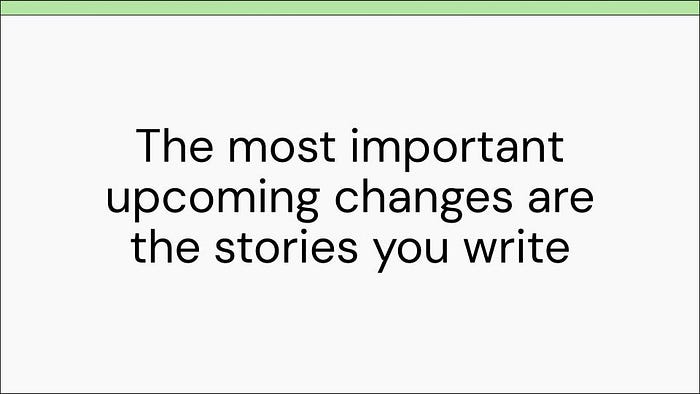
The biggest change coming, though, is what you’re going to write. We’re Boosting more and we’re getting better at rewarding quality as defined in the eyes of our members. The stories on Medium are really the most important part of the Medium experience. So the biggest change to Medium is going to be whatever it is that you choose to write. And I can’t wait to read it.
Last, as a representative of the entire team, I’ve been asked to say specifically how much we appreciate all of you. There’s so many roles that you play on Medium: writer, reader, curator, editor, publisher. Thank you for doing your part to make the world a better place. Thank you for being part of Medium.

